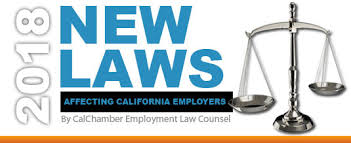January 9, 2018
 Stop asking about salary history – AB 168 bars employers from asking job applicants about their previous salary. The legislation’s goal is to narrow the gender gap by preventing employers from basing offers on prior salary and thus, presumably, perpetuating historical discrimination. This will also remove the perceived gap in negotiating power between an employers and employees who must disclose their prior salary. Employers should ensure that their job applications don’t seek prohibited information and that those interviewing applicants know not to ask these questions.
Stop asking about salary history – AB 168 bars employers from asking job applicants about their previous salary. The legislation’s goal is to narrow the gender gap by preventing employers from basing offers on prior salary and thus, presumably, perpetuating historical discrimination. This will also remove the perceived gap in negotiating power between an employers and employees who must disclose their prior salary. Employers should ensure that their job applications don’t seek prohibited information and that those interviewing applicants know not to ask these questions.- More employers must offer parenting leave – SB 63, officially titled the Parental Leave Act, requires employers with between 20 and 49 employees to offer parenting leave that mirrors the Family Medical Leave Act. The new Act allows employees who work for a covered employer to take 12-weeks of unpaid, job-protected leave if they have worked a minimum of 1,250 hours in the 12-months prior to taking leave. Employees can take leave only for the purpose of bonding with a newborn child, adopted child or foster child within a year of the birth or placement. Covered employers will also need to maintain health coverage under the same terms as an active employee. The Act also prohibits discrimination and retaliation against an employee for taking parental leave.The Parental Leave Act does not require employers to pay any portion of the leave but requires that employees be able to use accrued sick and vacation time. Employees can apply to have a portion of the parental leave paid for through the state’s Paid Family Leave program. As we’ve previously explained, San Francisco requires some employers to pay a remaining portion of parental leave.
- Expanded harassment training – California requires at least biannual harassment training for supervisors in companies with 50 or more employees. Having given a dozen sessions of the training in the last month, I can assure you that there’s no shortage of material to talk about. But as of January 1, 2018, SB 396 requires that the training include information on gender identity, gender expression, and sexual orientation. If your handbook doesn’t specifically prohibit discrimination and harassment on those bases, you’re overdue for a revision.
- Ban the box – Following the leads of San Francisco and Los Angeles, AB 1008prohibits employers with five or more employees from:
- Asking on employment applications about criminal convictions;
- Asking applicants about criminal convictions before making a conditional offer of employment;
- When conducting background checks on applicants, considering, distributing, or disseminating information about prior arrests not leading to conviction, participation in diversion programs, or convictions that have been sealed, dismissed, expunged, or otherwise nullified.
Employers who wish to rely on criminal conviction information to withdraw a conditional job offer must notify the applicant of their preliminary decision, give them a copy of the report (if any), explain the applicants right to respond, give them at least five business days to do so, and then wait five more business days to decide when an applicant contests the decision. There are exceptions for employers who operate health facilities hiring employees who will have regular access to patients or drugs.
- Minimum wage increases – On January 1, 2018, the California state minimum wage goes up to $11.00 per hour for businesses with 26 or more employees and $10.50 per hour for smaller companies. The inimitable Sahara Pynes discusses which cities are raising their minimum wages here.